
And rodents have a bit of a reputation as being cold or aloof.
That they just don’t care too much for their owners.
Is that true of chinchillas? Are they a bit aloof, or are chinchillas friendly?
The truth is, they can be both.
The good news is, they generally start out shy and timid, but almost always end up being friendly.
But they require something from you to get there.
What do they need from you?
Keep reading to learn exactly how you can ensure your chinchilla is friendly and loving toward you and your family.
Contents
Are Chinchillas Friendly?
Chinchillas are friendly animals and common to keep as domesticated pets. But not at first and not with everyone. It takes time.
Chinchillas are usually less friendly with young children and with new owners during the first weeks, while they are adapting to their new environment. But once they recognize and trust their owners, they are social and friendly pets.
In addition to the answer above, I also want to touch on some other common questions that many chinchilla parents have about a chinchilla’s behavior.
Ultimately my goal is to prove how social and friendly a chinchilla is and can be. By the end of the post, if you are currently on the fence about getting a chinchilla, I think you will finally be able to make that decision.

😕Adopting and caring for a new chinchilla can be intimidating and confusing. But it does not have to be.
Be sure to check out my full digital eBook “Avoiding Critical Mistakes: Ultimate Chinchilla Care eBook” for the best advice, tips, and tricks and supply recommendations to make adopting and caring for a chinchilla much more comfortable and easier to understand.
You can learn more about this eBook offer using the link directly below.
Learn more here:👉 Avoiding Critical Mistakes: Ultimate Chinchilla Care eBook Offer
Chinchillas Are Friendly Most Of The Time
Let’s start with a brief video on the topic. Just be sure to continue reading the post after the video, for additional details on how to get your chinchilla into a friendlier state.
Here’s that quick video for you directly below👇
Alright, now that we have that out of the way, let’s get back to the subject at hand. Although chinchillas are very friendly, they are also unique with several characteristics and behaviors they display.
All angles need to be covered and discussed before taking the leap of faith to purchase and care for a chinchilla. That’s because they do live for a long time. Up to 15-20 years with proper care. It is a big commitment and responsibility.
Chinchillas can make a perfect pet under the right circumstances and are known to be extremely friendly. Once they warm up to you of course.
This is typical of many pets. Not just chinchillas.
On the other end of the spectrum, they can also be very shy and not enjoy being touched, poked, or prodded by strangers. This goes for holding the chinchilla as well. Not all chinchillas enjoy being held, but many do.
Non-proper holding techniques can certainly spark a chinchilla to not be as friendly as you would like. Read that post to learn how to get your chinchilla to enjoy being held.
Learn To Communicate With Your Chinchilla
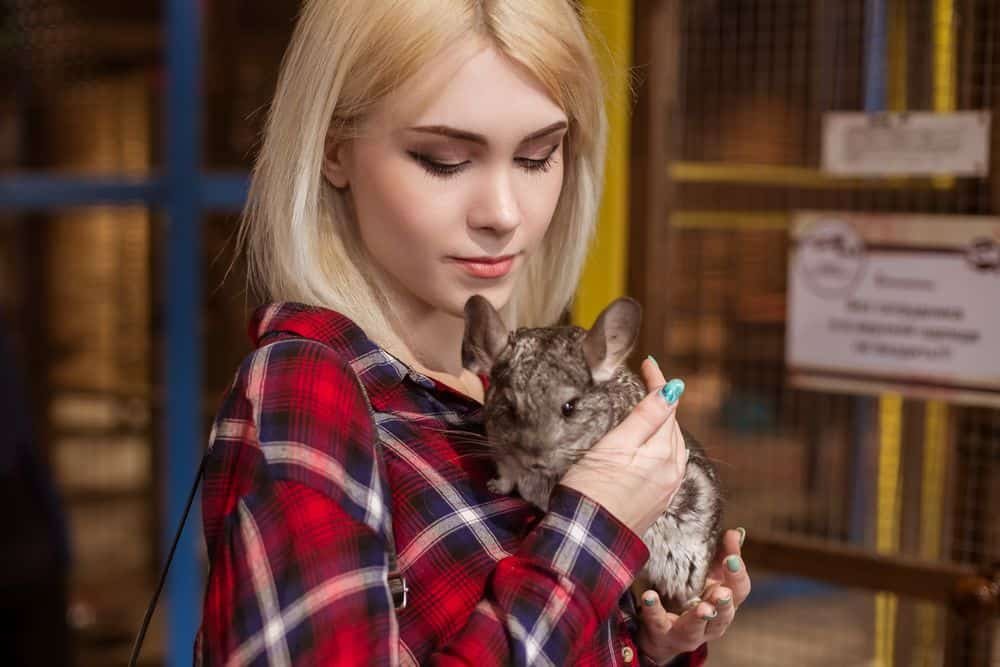
Chinchillas are heavily preyed upon in the wild. They are naturally prone to run away from danger and can often even try to elude you.
It’s nothing personal and doesn’t mean they are not friendly and that they do not love you.
It’s easy for a chinchilla to become severely frightened by unwanted noise or unwelcomed touches. When a chinchilla gets scared is when it is most likely to display 2 anti-social behaviors.
Typically, this is going to happen during the first week or two of owning your chinchilla, while it is still adapting to its new surroundings.
- Barking: this usually indicates your chinchilla is scared
- Biting: this occurs when you poke or attempt to grab at a chinchilla when it is cornered or scared
In my video above, I discussed how much an enclosed close space can help your chinchilla warm up to you. It helps you understand your chinchilla much faster by interacting more closely.
It helped me specifically with a few things.
- It helped me learn my chinchilla’s body language much faster.
- It helped me learn how to tell when my chinchilla is happy and what makes her happy with me.
- It helped me learn how to get my chinchilla in and out of the cage with ease.
- It helped me understand what all of the sounds and noises a chinchilla will make meant and how to respond.
I also show you how I used a specific pop-animal play tent to do this.
Here is the link to my post on the best chinchilla play tents. The one I use is the first one mentioned in that article.
If you are a new chinchilla owner or struggling to get your chinchilla to warm up to you, I highly recommend giving this a try.
It made a world of a difference for me and I’m sure it can help you dramatically as well, especially during the first weeks of having your pet in your home and away from what it has grown accustomed to.
Don’t worry, though. Chinchillas adapt to their new environment very quickly.
After they do, you can expect them to be much more friendly, as long as you are patient and respond to the messages they are attempting to communicate with you.
They have emotions just like you or I do and they do their best to let you know how they are feeling on a given day. Listen to them and they will be much more friendly than you may believe is possible.
Chinchillas Attach And Bond With Owners
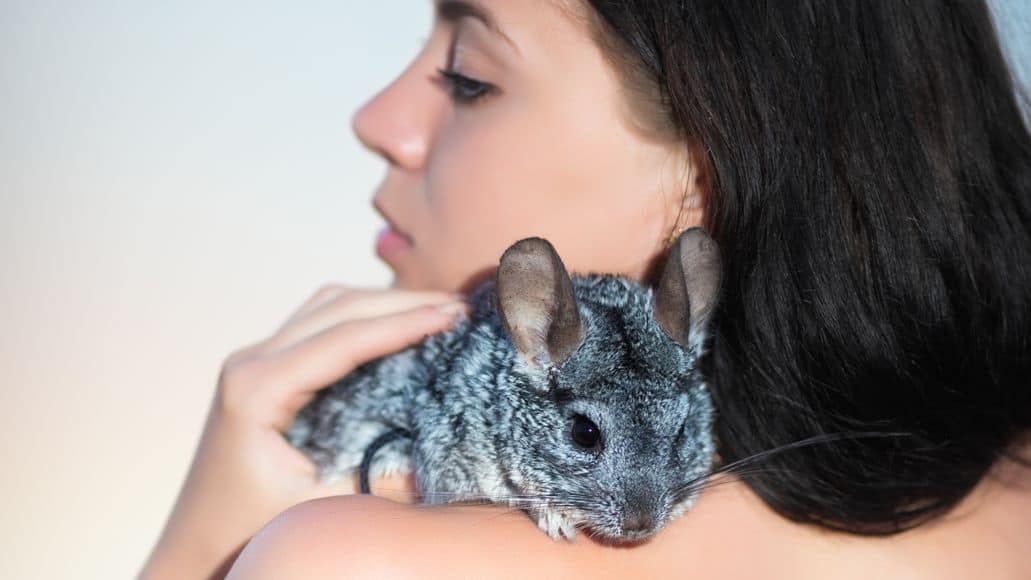
Building a bond with your chinchilla is a slow process in the beginning. However, taking things easy and slow is one sure-fire way to have a very loving, friendly, and attached chinchilla, especially towards the primary caregiver and owner, as they begin to recognize you.
Chinchillas, in the first few weeks of getting acclimated to a new home, aren’t going to do a whole lot of anything.
All they do during this time is hide and sleep within their nest box and get used to sounds, smells, and visuals around the house in the room where you decide to keep them.
Allow them to sit in their cage. Ensure you are providing one of the best chinchilla cages to ultimately keep them happy.
Let them get used to sounds and sights and temperatures in the room where they will live, before trying to build that friendship that will last forever.
Your chinchilla will thank you for this later.
Just remember, patience is key when adopting and caring for a chinchilla. If you can show patience, the bond between you and your chinchilla will grow and prosper.
If you take our advice and exercise patience, you will be on the right path towards building a strong bond. Your chinchilla will grow into a very tame, controlled, and loving pet with a deep affection toward you.
Most chinchillas are also friendly with other chinchillas. They do just fine with other chinchillas in their habitat. But not all chins are this way. Some are definitely loners.
Some chinchillas will even interact with dogs or other animals in the home, as long it’s under calm and tame conditions.
Are Chinchillas Ever Mean?
Most Chinchillas are not mean and don’t use any intimidating behavior to show that they may be ready to bite or hurt you or another human or animal.
You can read my post discussing if chinchillas are mean for more on this.
Remember, chinchillas are the hunted, not the hunters, in their natural habitat, so a chinchilla is programmed to flee and run for safety.
Once they are comfortable and don’t feel threatened, they are naturally friendly and loving pets.
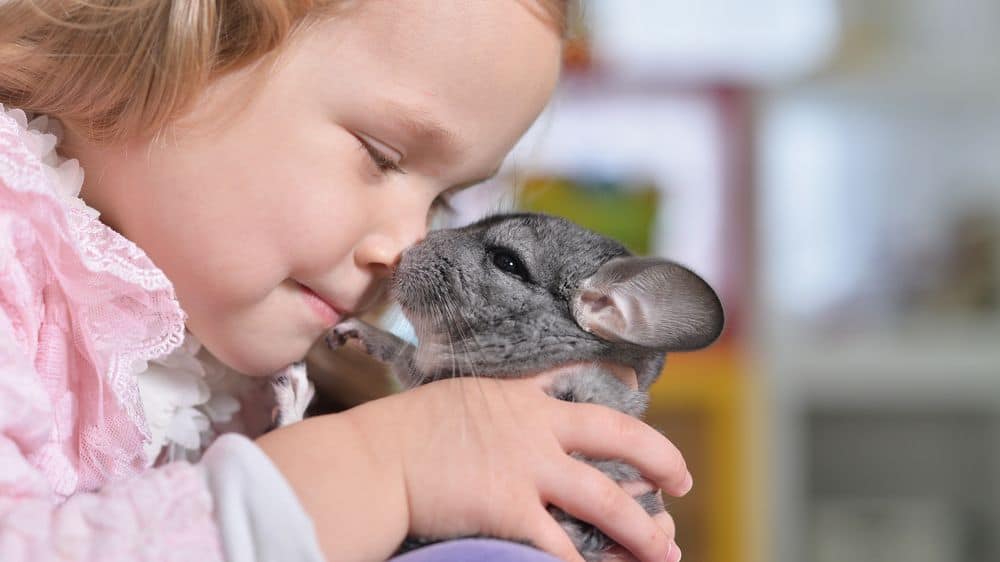
Chinchillas naturally do not want to fight or display non-friendly characteristics, although it could be possible, if provoked in the wrong manner. This could include you attempting to hold your chinchilla when it does not want to be held.
A Few Non-Intentional, Non-Friendly Behaviors
The most un-friendly and unwelcomed behavior a chinchilla may display is the act of waking you at odd hours, due to being crepuscular.
I’m kidding.
Obviously the chinchilla is not doing this intentionally. This only means that they are the most active at dusk and dawn. It is also a primary reason not to allow your chinchilla to sleep in your bedroom.
For those of you who don’t like an early morning wake up call, it’s best to have a separate sleeping room for your chinchilla.
In some situations, a female chinchilla may also spray urine if she is extremely scared or attempting to tell you to back off.
Additionally, chinchillas are known to slip their fur when they are terrified. This is another defense mechanism chinchillas use in the wild to escape predators.
It’s a form of chinchilla shedding and it’s where an entire clump of hair will release from your chinchilla. Don’t worry, your chinchilla’s hair will grow back quickly and it’s completely normal for this to happen.
Don’t rush to brush your chinchilla or try to remedy the situation. It will happen often over the course of your chinchilla’s life.
Outside of that, your chinchilla won’t do much to annoy you or display any violent or non-friendly behaviors. Again, chinchillas make great pets and most people who own one couldn’t imagine life without one.
They are a one of kind animal to care for and raise. Chinchillas are also extremely intelligent and will often surprise you.
Non-Friendly Behavior Typically Occurs During The First Few Weeks
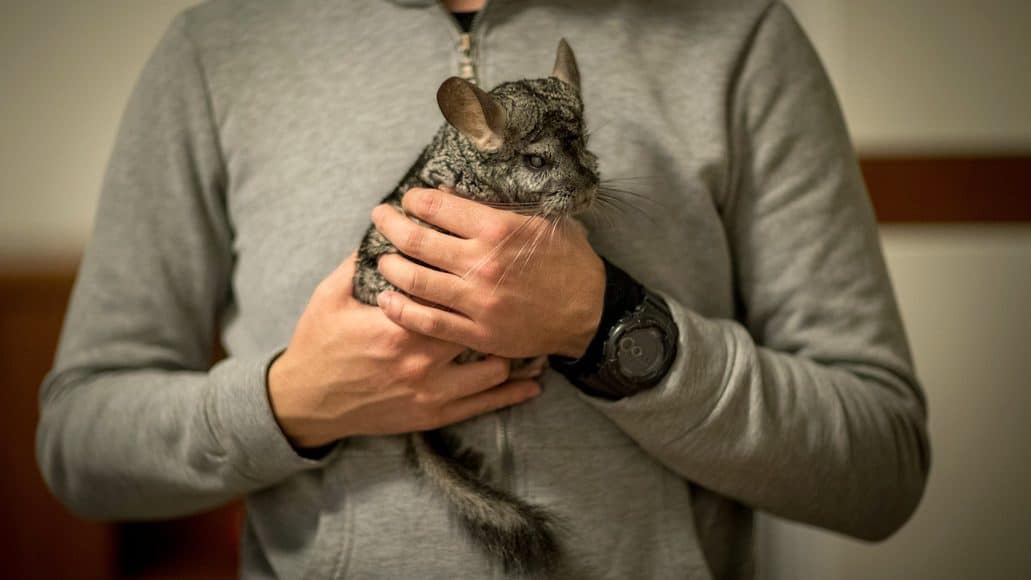
Chinchillas are very structured. They like routines to remain the same.
No, your chinchilla won’t go on a violent rampage if you miss feeding time, a scheduled cage cleaning, or even the common dust bath day.
However, it is best for building trust and a strong bond with your chinchilla that it knows it can count on these routines and behaviors. It goes a long way for you and your chinchilla to become even closer as time passes, and your pet to become happier and friendlier.
Include activities that are routine to help build the bond and relationship. These could include the following activities:
- Playtime out of the cage and bonding time
- Feeding time
- Dust Bath Time
- Cage bedding change time
And of course, the occasional treat from time to time, such as chinchilla safe fruit or other foods that are deemed to be chinchilla safe and healthy, can be a great way for you to interact with your chinchilla in a friendly manner.
If you aren’t 100% sure of all the foods chinchillas can and will eat, be sure to read my guide by following the link a few words back.
Chinchillas are very alert animals and get used to these time blocks and structures quickly. Abnormal timing or unwanted loud sounds or activity can startle your chinchilla easily if it isn’t used to it.
Again, this doesn’t cause your chinchilla not to be friendly with you in the future. It’s best practice for you to pay attention to these warning signals and provide the space for your chinchilla that it is asking for.
Are Chinchillas Aggressive?
No, chinchillas are not aggressive. Chinchillas may be timid, reserved, or even scared. But even when threatened, it’s rare for a chinchilla to show aggression.
Typically, they will hide instead. Or, at the very worst, spray urine or make different sounds. Chinchillas may strike at your fingers, if you have leftover food on them, or they may bite an un-welcomed hand that startles them.
Typically, this will not be the owner’s hand, but it could be, if you are extremely loud or handle your chinchilla in a non-friendly manner.
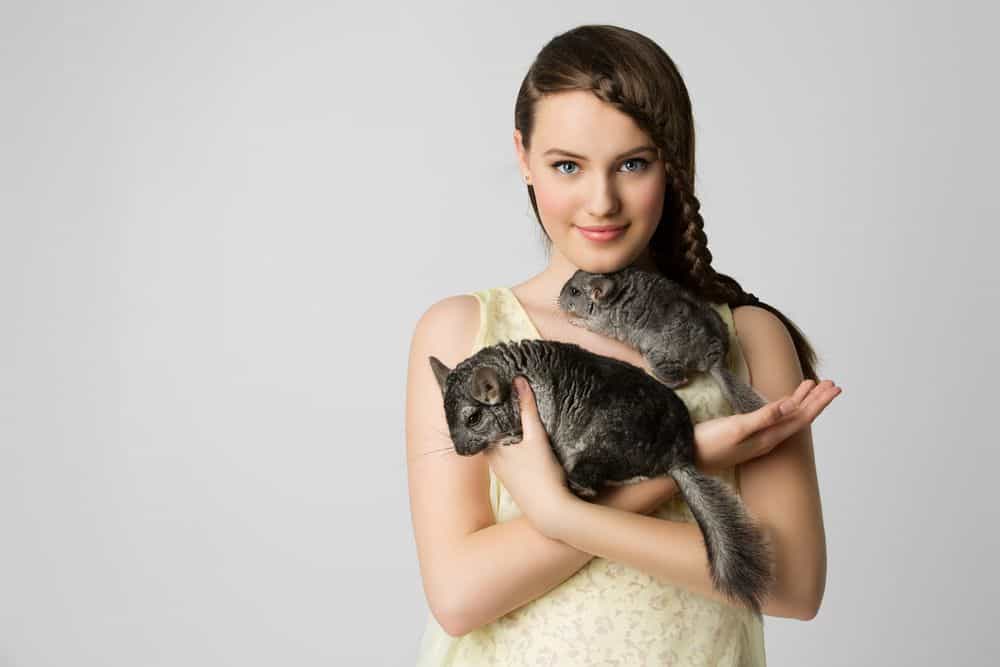
In all honesty, I’m shocked this ever happens to anyone. I have friends and family that have never met my 5-year-old female chinchilla and she has never been anything but sweet and inviting towards them.
However, I would be lying to state it’s not possible.
I’ve seen enough stories on forums and online communities from other chinchilla owners to understand that it is possible and things do happen.
However, if it makes you feel any better, I have never once had a problem with my chinchilla. No problems with biting or showing any aggressive behavior towards anyone, even if they are not a part of the family.
My chinchilla even acts friendly towards my 100-pound yellow lab.
It’s important to learn how to handle your chinchilla and care for it correctly, to avoid this ever being an issue. Outside of that, no chinchillas are not aggressive. They are more of a scared, timid animal just looking to relax and love their owners.
A quick tip for making this transition quickly is learning how to pick your chinchilla up correctly and safely using the base of the tail technique.
Often, chinchilla owners state this is the only problem area they have ever had with irritating their chinchilla: picking them up incorrectly.
Do Chinchillas Make Great Pets?
Yes, chinchillas make good family pets. Chinchillas are a top 10 small pet if you ask me. For kids of all ages and adults.
It’s important your young kids don’t mishandle or chase your chinchilla around due to overheating and the potential for a heat stroke.
Outside of that precaution, chinchillas have long life spans and require minimal money and effort, outside of love and affection.
Chinchillas Are Friendly: Final Thoughts
Most chinchillas are friendly in most circumstances, if you can remain patient and build a strong bond with them before attempting to do too much else.
Does it take time to grow a bond with your pet?
Yes, of course. This is true of any animal.
The chinchilla needs to warm up the environment and warm up to your voice, smell, and touch.
Give it time out of the cage interacting with you in a chinchilla proofed room and allow the relationship to grow and flourish.
It won’t be long before you have a strong bond and relationship with your chinchilla and the two of you are enjoying dust baths and playtime on the regular.
Chili and I wish you the best of luck and we know 100% without a doubt that you will experience just how friendly a chinchilla can be, and how great of a pet they can make for the entire family.
Share your thoughts on this topic.
Do you have any stories about your chinchilla and how friendly chinchillas can be?
Be sure to share those thoughts, stories, and concerns by dropping a comment below.
As always, Chili and I appreciate you stopping by and reading today and we will see you again next time.
d says
hi